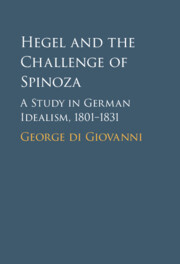Book contents
- Hegel and the Challenge of Spinoza
- Hegel and the Challenge of Spinoza
- Copyright page
- Dedication
- Contents
- Preface
- Abbreviations
- Chapter 1 Introduction: The Spinoza Connection, or the Discovery of “Feeling”
- Chapter 2 The Nature of “Nature” in Contention
- Chapter 3 The Transcendental Spinozism of the Wissenschaftslehre
- Chapter 4 Schelling’s Prophetic Spinozism
- Chapter 5 Schelling, Hegel, and Positivity
- Chapter 6 Of Things Divine and Logical
- Bibliography
- Index
Chapter 2 - The Nature of “Nature” in Contention
Published online by Cambridge University Press: 17 September 2021
- Hegel and the Challenge of Spinoza
- Hegel and the Challenge of Spinoza
- Copyright page
- Dedication
- Contents
- Preface
- Abbreviations
- Chapter 1 Introduction: The Spinoza Connection, or the Discovery of “Feeling”
- Chapter 2 The Nature of “Nature” in Contention
- Chapter 3 The Transcendental Spinozism of the Wissenschaftslehre
- Chapter 4 Schelling’s Prophetic Spinozism
- Chapter 5 Schelling, Hegel, and Positivity
- Chapter 6 Of Things Divine and Logical
- Bibliography
- Index
Summary
Prior to 1800, Schelling had tried to overcome Kant’s alleged formalism with a theory of nature which presented the latter as a process of progressively more complex forms of inanimate and organic existence. The process culminated in the reflectively intelligent life which made idealism possible. As Schelling contended regarding Fichte, in his Science the latter had abstracted only this last moment of the process, and this was a claim that Fichte could not accept. By 1800, Fichte was thus defending his Science of the “I” on two fronts – against Kant who in 1799 had singled it out as being empty logic and against Schelling who was in effect making the same claim. Chapter 2 is dedicated to an account of these events and the exposition of the texts associated with them. What transpires from Fichte’s response to Kant, and his controversy with Schelling, is that there was a disconnect between all involved because of an ambiguity inherent to the monism, and the intuitionism the latter required, which all concerned accepted (Kant only hypothetically, by default). The ambiguity was an encumbrance from classical metaphysics that still affected the new Idealism. It was Spinoza’s challenge.
- Type
- Chapter
- Information
- Hegel and the Challenge of SpinozaA Study in German Idealism, 1801–1831, pp. 25 - 56Publisher: Cambridge University PressPrint publication year: 2021

